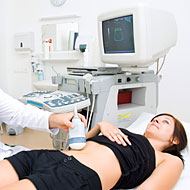- General Articles
- General Pregnancy Questions
- Baby Growth
- Pregnancy Diet
- Miscarriage
- During Pregnancy
- Twin Pregnancy
- Toddler Meals
- Home Remedies During Pregnancy
- Breastfeeding
- Pregnancy Week By Week
- Pregnancy Tests
- Ectopic Pregnancy
- Pregnancy Signs and Symptoms
- Pregnancy Stages
- Potty Training
- Fetal Development
- Preschooler
- Postpartum Depression
- Toddler Illness
- Baby Care
- After Pregnancy
- Molar Pregnancy
- During Delivery
- Beauty and Style
- Pregnancy Clothing
- Preconception
- Fertility
Effects of Polycystic Ovarian Syndrome (PCOS) on Pregnancy
Polycystic ovarian syndrome, also known as PCOS is interlinked with pregnancy. One of the effects of this condition is the possibility of infertility or reduced chances of getting pregnant. PCOS can also affect hormone levels, the menstrual cycle, physical appearance, blood vessels and the heart.
Statistics state that between one in ten women of childbearing age have PCOS and around 5 million women are affected by it in the United States alone.
Unfortunately the causes of polycystic ovarian syndrome are still unknown, but medical experts speculate that several factors could play a role in women with this condition, the main one being genetics. Research states that women affected by PCOS are most likely to have a sister or a mother who also has PCOS.
The main problem in polycystic ovarian syndrome is a hormonal imbalance. Here, the ovaries create more androgen than usual. Although a male hormone, females also create this hormone in minimal amounts. However, when a woman's body creates more than the required amount of androgen, it affects the release and development of the eggs during ovulation. Insulin can also be connected to PCOS. Excess insulin tends to increase the creation of androgen. High levels of androgen leads to acne, weight increase, excess hair growth and/or ovulation problems.
Polycystic ovarian syndrome symptoms vary from woman to woman. Some of them are:
- Irregular or absent periods ranging from very light to very heavy flow
- Infertility due to ovulation issues
- Cysts on ovaries
- Weight gain, especially around the waist area
- Increased body hair on the face, the chest, stomach and even around the nipples
- Decrease in breast size
- Voice deepening
- Thinning of the hair on the head
- Clitoris enlargement
- Acne
- Skin tags
- Skin darkening in patches around the arms, breasts, thighs and neck
- Depression or anxiety
- Pain in the pelvic region
- Sleep apnea
PCOS is one of the most common causes of infertility in women; as the ovary doesn't produce all of the hormones required for the eggs to fully mature.
While there is no known cure for PCOS, there are ways to manage the condition, depending on the symptoms and whether the person affected wants to get pregnant or not. Treatments include medication and in some cases surgery. Some of the polycystic ovarian syndrome treatment options are:- Lifestyle changes: Most women affected with PCOS are overweight or obese. Exercising and eating healthy can help in lowering blood sugar levels, high cholesterol and high blood pressure. Even a 5 percent loss in body weight can help to balance hormones and make the menstrual cycle more regular.
- Medication: For women who don't want to get pregnant, birth control pills help to decrease male hormones, control the period cycle and reduce acne. Diabetic medication has also been known to assist PCOS symptoms. Women who wish to get pregnant can take fertility drugs; there are several medications that can stimulate ovulation but it is important to rule out other causes of infertility. In-vitro fertilization is another option to get pregnant but it is very expensive. There are also medications to reduce excessive hair growth.
- Surgery: Ovarian drilling or pelvic laparoscopy is also an option for infertility where a section of the ovary is destroyed to help with ovulation and decrease the male hormone. However, this type of surgery has only temporary effects and does not help with physical appearance symptoms.
Apart from these treatments, there are laser treatments, hormonal treatments and creams to remove or reduce unwanted hair.
Women with PCOS also stand the risks of miscarriages, high blood pressure during pregnancies, gestational diabetes and premature delivery. You should consult your gynecologist to know more about this condition and how you can deal with it.
Read more articles from the Fertility Category.



 7 Must-Haves Before Your Baby Arrives
7 Must-Haves Before Your Baby Arrives Bonding Games for Babies
Bonding Games for Babies DIY Baby Bath Towel Apron
DIY Baby Bath Towel Apron Common Late Pregnancy Fears
Common Late Pregnancy Fears